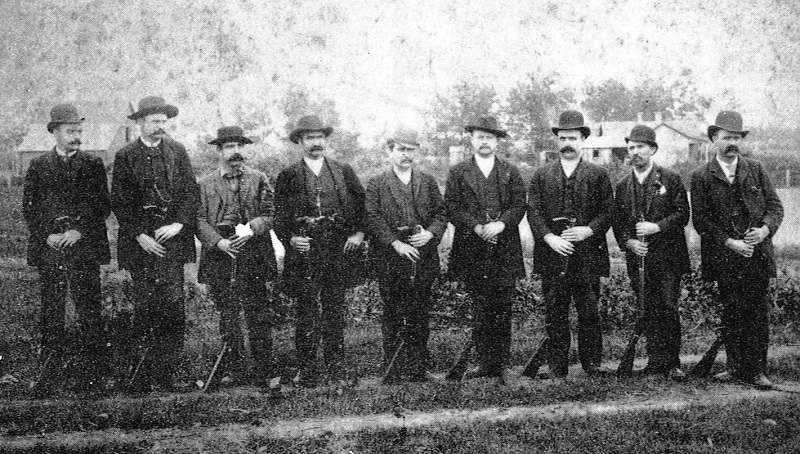Frontier justice, the case of Mr. and Mrs. O’Donnell

An ambitious young man and a beautiful young woman had their whole lives ahead of them. On January 11th, 1871, Cornelius O’Donnell wed Miss Margaret Leo of Chicago at St. Rose’s Church in Wilmington. They entered life together in the newly formed frontier town of Braidwood, a place they could make their fortune.
Cornelius O’Donnell was a man among men. He was smart and strong and took “nothing from nobody.” He was the perfect man for the job of Chief of Police, and he took to it. We read on August 10, 1872 in the Wilmington Advocate:
“On Wednesday last two noted pugilists in Braidwood were found engaging in the manly art, and arrested by chief of police, O’Donnell. They were speedily arraigned before Justice Mooney who fined each of the champions $5 and costs.”
Two years later, he had moved up in the ranks to Will County Deputy Sheriff.
These same attributes also made him a perfect saloon keeper, and for the most part he had no trouble keeping the peace in his own saloon as well. However, in October of 1879, all of that flew out the door when John Feeley came in.
John Feeley was a farmer from Custer Park who lived with his wife, seven children and his mother. The sandy soils grew good potatoes, but little in the way of cattle feed. Feeley’s cattle had roamed onto his neighbor’s property and the neighbor, Chas O’Connell, was holding them hostage.
The Joliet Signal describes what happened next: “Upon demanding their release, some hard words passed between the owner of the cattle and O’Connell and a bed feeling existed between the two men, which finally broke out in a personal encounter in the store and saloon of O’Donnell about 8:30 the same evening.
“After a war of words O’Donnell struck Feeley a severe blow and an exciting time all around was the natural result, Feeley flourished a revolver when unfortunately, ‘Con’ O’Donnell stepped in as peacemaker and while endeavoring to secure the shooting iron and prevent a tragedy the pistol was discharged while in Feeley’s hand, the ball entering O’Donnell’s left side, causing death to ensue the next day noon.”
The outpouring of feeling was wide spread, we read: “The late Cornelius O’Donnell held a warm place in the hearts of nearly all who knew him here, and he will be missed very much. He was the soul of honor always genial and accommodating. What marvel then that strong men shed tears like children beside his remains on Sunday last. What marvel that his funeral was attended by friends from all directions?”
Feeley was brought up on charges, but the jury found it an accidental shooting and let him go. For some reason, Feeley thought himself the hero of the situation.
Mrs. Margaret O’Donnell thought herself the real victim; she had lost her husband and source of income. But Margaret was strong, and she had the sympathy of the town on her side. She took over her husband’s saloon and ran it the way he would.
About a year later the final chapter played out. From the pages of the Joliet Sun we read: “Thursday afternoon, John Feeley came to Braidwood with a load of potatoes. Feeley is the man charged with the killing Con. O’Donnell. Mrs. O’Donnell, the wife, was at her place of business in Braidwood, and says that Feeley passed by her place 4 or 5 times, each time giving his hat a tip to one side in a kind of defiant air, to Mrs. O’Donnell.
“About four o’clock she went to her safe and took out her money to deposit it in the bank and she took there from a revolver. She says Feeley watched and followed her. She attended to her business, and was met by Feeley, who, she thought, was going to speak to her, but he passed on.”
“She went to the post office. He followed and met her the second time, and, being half crazy with the thought of her dead husband, this man goading her to desperation, she drew her revolver and shot; the ball did not take effect; Feeley made motions as though he was going to draw a revolver, when she pulled the trigger the second time, and this time the ball entered one of his arms, which shattered it terribly, so badly, that it is thought that amputation will be necessary.”
At this point there is a discrepancy in the newspaper coverage of this incident. In the Wilmington papers Margaret O’Donnell is described like this: “Nearly crazed with agitation, Mrs. O’Donnell was at once prostrated, and on reaching her home was put under the influence of anesthetics.”
But the Joliet papers say: “Mrs. O’Donnell was perfectly calm and collected, signing the bond without a quiver of the hand. She felt that she had done what was right.”
Mrs. O’Donnell was found not guilty in a court of law. Frontier justice had played out, perhaps not at first, but all was put right in the end.
Sandy Vasko is Director of the Will County Historical Museum & Research Center and President of the Will County Historical Society.
